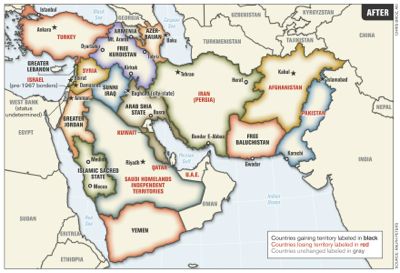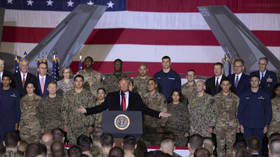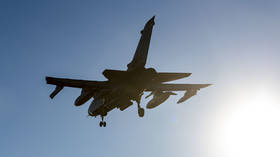RESHAPING THE GREATER MIDDLE EAST
How Washington intends to triumph
During the quarter of Western lockdown, the map of the Middle East was profoundly transformed. Yemen has been divided into two separate countries, Israel is paralysed by two Prime Ministers who hate each other, Iran openly supports NATO in Iraq and Libya, Turkey occupies northern Syria, Saudi Arabia is close to bankruptcy. All alliances are being called into question and new dividing lines are appearing or rather reappearing.
VOLTAIRE NETWORK | DAMASCUS (SYRIA) | 23 JUNE 2020

- In 2001, Donald Rumsfeld and Admiral Arthur Cebrowski defined the Pentagon’s objectives in the era of financial capitalism. The staff then drew up this map of the partition of the Greater Middle East. However, in 2017, Donald Trump opposed (1) border changes (2) the creation of states governed by jihadists (3) the presence of US troops in the region. From then on, the Pentagon reflected on how to continue the destruction of state structures without questioning the countries and to the satisfaction of the White House.
For two decades Washington has been trying to "reshape" the "Greater Middle East", an arbitrarily defined region stretching from Afghanistan to Morocco. However, over the last three years two strategies have clashed: on the one hand the Pentagon, which wants to destroy the state structures of all the countries in the region, whether friends or enemies, and on the other President Trump, who intends to dominate the region commercially without military occupation.
When lockdown was declared to prevent the Covid-19 outbreak, we warned that profound changes were taking place in the region and that it would no longer look like the one we had before. We started from the observation that Washington had given up on destroying the state in Syria, now a Russian reserved area. So the main question was, on the one hand, what the Pentagon’s next target in the region would be. There were two possible answers: Turkey or Saudi Arabia, both of which are allies of the United States. And, secondly, what markets the White House would try to open.
This analysis was shared by all those who interpret the last twenty years as the implementation of the Rumsfeld/Cebrowski strategy for the destruction of state structures in the Greater Middle East. It was, on the contrary, rejected by those who, refusing to take international factors into account, naively interpret events as a succession of civil wars (Tunisia, Egypt, Libya, Syria, Yemen and perhaps soon Lebanon) with no link with each other.
Yet three months later, Turkey is militarily supported by Iran in Libya, while Saudi Arabia has disappeared from the radar, particularly in Yemen, and the Emirates are becoming the pole of regional stability. The regional shift has started to benefit Ankara and Abu Dhabi and to the detriment of Riyadh. The most radical transformations are the turnaround of Iran on the side of NATO, the easing of US-Turkey relations and the rise of the United Arab Emirates. So we were right, and those who give credit to the narrative of civil wars have become self-intoxicated. Of course, they will not recognize it and will need several months to adapt their erroneous discourse to the realities on the ground.
It goes without saying that each actor will have to adjust his or her position, so our observations are valid only for today. But the region is changing very quickly and those who think too long to react will automatically lose out; a point that is particularly valid for Europeans. Finally, this new situation is very unstable and will be called into question by Washington if President Trump does not succeed himself, or by Moscow if President Putin does not manage to retain power at the end of his presidential term, or by Beijing if President Xi persists in building sections of the Silk Roads in the West.
In the greatest media silence, the United Arab Emirates disassociated itself from Saudi Arabia on the Yemeni battlefield. They supported tribes that excluded Saudi troops from their country. Together with the British, they occupied the island of Socotra, taking control of the Strait of Bab el-Mandeb at the outlet of the Red Sea. They operated a de facto partition of Yemen, taking over the Cold War borders between North Yemen and South Yemen [1].
Iran, in spite of its border dispute with the Emirates and the war that they have just fought through Yemeni intermediaries, has been satisfied with this outcome, which allows the Shiite Houthis to obtain a semblance of peace, but not yet to defeat the famine. Finally accepting that Donald Trump had been elected president of the United States, Tehran renewed contact with Washington three years late. Spectacularly, the government of Hassan Rohani announced military support for the el-Sarraj government in Libya [2]. In practice, this means that it supports the Muslim Brotherhood (as in the 1990s in Bosnia-Herzegovina), Turkey and NATO (as during the regime of Shah Reza Pahlevi). Under these conditions, we no longer see what Iran is doing in Syria where it is supposed to fight against its new allies, the jihadists, Turkey and NATO.
Of course, it must be borne in mind that Iran, like the new Israel, is two-headed. The statements of the Rohani government may not commit the Guide of the Revolution, Ayatollah Ali Khamenei.
Be that as it may, the reversal of this centrepiece puts Lebanese Hezbollah in a bad position. It now appears that it was indeed the United States that deliberately provoked the collapse of the Lebanese pound with the help of the governor of the Central Bank, Riad Salamé. Washington is now trying to impose on Beirut a US law (Caesar Syria Civilian Protection Act) forcing it to close the Lebanese-Syrian border. To survive, Lebanon would be forced to form an alliance with the only other power with which it shares a land border: its former colonizer, Israel [3]. Certainly, the arrival in power in Tel Aviv of a two-headed coalition, combining the supporters of the former British colonial project and those of the nationalism of the third generation of Israelis, no longer allows for an invasion of Lebanon. But this coalition is extremely fragile and a return to the past remains possible, if not probable. The only solution for Lebanon is therefore not to apply US law and to turn not to the West, but to Russia and China. This is what Hezbollah Secretary General Hassan Nasrallah dared to say publicly. He considers that Iran - despite its rapprochement with Turkey (present in the North of Lebanon with the Muslim Brotherhood [4]) and with NATO (present behind Israel) - remains culturally the intermediary between China and the West. Throughout antiquity and the Middle Ages, one spoke not the multiple local languages along the Silk Road, but Persian.
Historically, Hezbollah was created on the model of the Bassij of the Iranian Revolution, whose flag it shares. However, until the Syrian withdrawal from Lebanon in 2005, its armament came from Damascus and not from Tehran. It will therefore have to choose between its two sponsors, either for ideological reasons or for material reasons. Sayyed Hassan Nasrallah is a supporter of the Syrian secular model, while his deputy, Sheikh Naïm Qassem, is an unconditional supporter of the Iranian theocratic model. But the money is in Tehran, not Damascus.
In any case, the Lebanese may be on the wrong track. They fail to understand why Washington is overwhelming them because they do not consider that the United States and Russia have decided to implement the regional Yalta that they negotiated in 2012 and that Hillary Clinton and François Hollande have blown up. In that case, Beirut may have been included in the Russian zone of influence without their knowledge.
Once again, and consistently for centuries, the interests of the Western powers have certainly been moving in the direction of secularism, but their strategy to dominate the region leads them inexorably to rely on the religious people against the nationalists (with the sole and brief exception of the USA in 1953).
Syria, encircled by US allies, has no choice but to source its supplies from Russia, something its ruling class has been reluctant to do for the past six years. This will only become possible with the resolution of the conflict between President Bashar al-Assad and his distant cousin, the billionaire Rami Makluf, and beyond, with all the Syrian oligarchs. This quarrel owes nothing to the family affair described by the Western media. It must be compared to the takeover of the Russian oligarchs by President Vladimir Putin during the 2000s, which enabled him to erase the errors of the Yeltsin period. Seventeen years of embargoes against Damascus have only delayed this inevitable showdown. It is only once this conflict has been resolved that Damascus will be able to consider recovering its lost territories, the Golan Heights occupied by Israel and Idleb occupied by Turkey [5].
Iraq was the second country - after the Emirates - to have understood the Iranian change. It immediately reached an agreement with Washington and the new Tehran to appoint the head of its secret service, Mustafa al-Kadhimi, as prime minister, despite the fact that he has been violently accused during the last six months by the former Tehran of having actively participated in the assassination in Baghdad of the Shiite hero Qassem Soleimani [6]. Iraq should therefore no longer fight the resurgence of its jihadist groups (mercenary organizations of the Anglo-Saxons and now supported by Iran), but negotiate with its leaders.
Israel, the only state in the world that is now governed by two prime ministers, will no longer be able to play the role of an extension of the Anglo-Saxon powers, nor will it be able to become a nation like the others. Its entire foreign policy is paralysed at the very moment when Lebanon is weakened and represents for it a prey of choice. For the supporters of the colonial project, united behind Prime Minister Benjamin Netanyahu and now losing momentum, Iran’s change is already visible in Iraq and Libya. There is an urgent need to invent a new iconic enemy in order to maintain itself. On the contrary, for the Israeli nationalists, united behind Second Prime Minister Benny Gantz, it is advisable not to throw stones at anyone and to negotiate cautiously with Hamas (i.e. with the Muslim Brotherhood) [7].
Egypt remains focused on its food problem. It only manages to feed its population with Saudi aid and plans its development with Chinese aid. For the moment it is paralysed by the Saudi retreat and the anti-Chinese US offensive. However, it is continuing to rearm.
Libya, at last, no longer exists as a state. It is divided in two like Yemen. Due to NATO’s victory in 2011 and the absence of US troops on the ground, it is the only place in the region where the Pentagon can pursue the Rumsfeld/Cebrowski strategy without obstacles [8]. The recent military successes of the el-Sarraj (i.e. Muslim Brotherhood) government - supported by Turkey and now also by Iran - should not be an illusion. The government of Marshal Haftar -supported by the Emirates and Egypt- is resisting. The Pentagon intends to prolong the conflict as long as possible to the detriment of the entire population. It supports both sides at the same time as it did during the Iraq-Iran war (1980-88) and will always come to the aid of the loser, whom it will abandon the next day.
The two big losers of the new situation remain: China and Saudi Arabia.
The Chinese influence stops in Iran. It has just been stopped by Secretary of State Mike Pompeo in Israel. Beijing will not build the largest desalination plant in the world and its projects at the ports of Haifa and Ashdod are doomed to failure despite the huge investments already made. No one will dare to eliminate the 18,000 Chinese jihadists at the Syrian-Turkish border [9] so that it will always remain unstable, closing the possibility of the northern passage of the Silk Road. There will thus remain only the hypothesis of the Southern passage, through the Egyptian Suez Canal, but this will remain under the control of the Westerners.
No one knows where Saudi Arabia stands. In three years, Prince Mohamed Ben Salmane (MBS) has managed to arouse wild hopes in the West and to alienate all the powers in the region by hanging and dismembering his opponents followed by dissolving their bodies with acid. His country had to retreat in Yemen, where it had recklessly ventured, and give up its great works, notably the construction of the free zone that was to house the world’s billionaires, Neom [10]. Its gigantic oil reserves are no longer objects of speculation and have lost most of their value. The greatest military power of the region is only a colossus with feet of clay about to die in the desert sands where it was born.
In the end, President Donald Trump is achieving his goal: he has defeated the Pentagon’s plan to give a state to a terrorist organization, Daesh, and then managed to get all the states in the region back into the US economic zone except Syria, which has already been lost since 2014. At the same time, however, the Pentagon also triumphed in part: it succeeded in destroying the state structures of Afghanistan, Iraq, Libya and Yemen. Its only failure was in Syria, certainly because of the Russian military intervention, but above all because the Syrians have embodied the concept of the state since the dawn of time.
The annihilation of Afghan state structures, according to the Pentagon’s plan, and the withdrawal of US troops, which will be effective on the day of the US presidential election, according to the will of President Trump, could have marked the alliance between these two forces. However, this is not the case. The Pentagon tried in vain to impose martial law in the United States in the face of the Covid-19 epidemic [11], then it gave covert assistance to the "Antifas" that it had already supervised in Syria [12] to coordinate supposedly "racial" riots. Russia, which has never wavered in its position, is wisely waiting to reap the laurels of its commitment in Syria.
Translation
Roger Lagassé
Roger Lagassé
[1] “First NATO-ME War Overturns Regional Order”, by Thierry Meyssan, Translation Roger Lagassé, Voltaire Network, 24 March 2020.
[2] “Iran openly backs NATO in Lybia”, Voltaire Network, 17 June 2020.
[3] “Hassan Nasrallah says US wants to cause famine in Lebanon”, Voltaire Network, 17 June 2020.
[4] “Turkey and demonstrations in Lebanon”, Voltaire Network, 13 February 2020.
[5] “Turkey’s de facto annexation of Syria”, Voltaire Network, 18 June 2020.
[6] “Washington, Tehran place one of Soleimani’s assassins in power in Iraq”, Voltaire Network, 16 May 2020.
[7] “The Decolonization of Israel has Begun”, by Thierry Meyssan, Translation Roger Lagassé, Voltaire Network, 26 May 2020.
[8] “Preparing for a new war”, by Thierry Meyssan, Translation Roger Lagassé, Voltaire Network, 7 January 2020.
[9] “The 18,000 al-Qaeda Uighurs in Syria”, Translation Roger Lagassé, Voltaire Network, 21 August 2018.
[10] “Egypt contributes part of its own territory for Plan Neom”, Translation Anoosha Boralessa, Voltaire Network, 8 March 2018.
[11] “Putchists in the Shadow of the Coronavirus”, by Thierry Meyssan, Translation Roger Lagassé, 31 March 2020. “The Pentagon against President Trump”, Voltaire Network, 12 June 2020.
[12] “NATO’s Anarchist Brigades”, by Thierry Meyssan, Translation Pete Kimberley, Voltaire Network, 12 September 2017.



